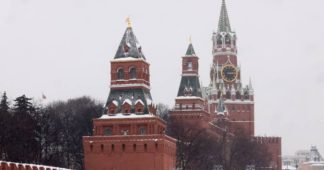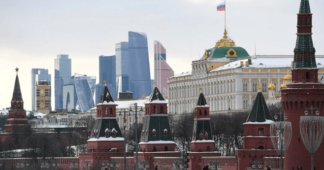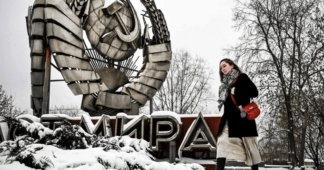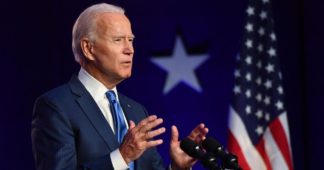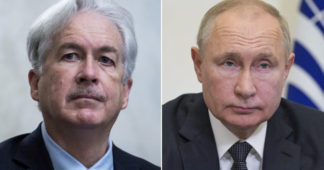Posted on
The eagerly awaited “written response” from the U.S. and NATO to Russia’s security proposals is now in the hands of President Vladimir Putin. And yet there is no sign the West caved in on Moscow’s insistence that NATO rescind its 14 year-old invitation to Ukraine to join NATO.
Those who expected the Russians to react to the West’s refusal to “redraw the security architecture of Europe” by promptly attacking Ukraine can breathe a bit easier. Although Putin’s spokesman, Dmitry Peskov, told reporters Thursday that the responses from the US and NATO provide “little ground for optimism,” he quickly added “there always are prospects for continuing a dialogue, it’s in the interests of both us and the Americans.”
Amidst the foreboding din in Western corporate media that, absent a written pledge to bar Ukraine from NATO, nothing else really matters to Putin and war is likely, Peskov has been much less gloomy on prospects for the bilateral talks. Immediately after the first bilateral talks on Jan. 9/10 in Geneva, for example, he noted: “It would be naive to think that one round of negotiations can bring comprehensive results.” (Bear in mind that few have been as close to President Putin as Dmitri Peskov. Their working relationship goes back more than two decades; since 2012, Peskov has been Putin’s press secretary.)
How Might Putin Regard His Half a Loaf
Call me old fashioned, but I have been practicing a simplified version of Kremlinology since the days of Nikita Khrushchev. It is called media analysis and includes a close reading of what prominent leaders say.
When he became CIA director, William Casey admitted being astonished at what we could glean from Soviet media. Well, media analysis was our bread and butter then and can provide helpful insights now as well. How best to decipher what Putin has said about the need for written agreements preventing further NATO expansion? He addressed this – and much more – head-on during a major speech on Dec. 21, 2021 before the senior military. (Please see if you can get an idea of what might be the rhetorical aim behind his emphasis on “written”; and hang in there long enough to get some feel for what he is, first and foremost, concerned about.)
Here is President Putin speaking to his top military officers:
“In particular, the growth of the US and NATO military forces in direct proximity to the Russian border and major military drills, including unscheduled ones, are a cause for concern.
“It is extremely alarming that … Mk 41 launchers, which are located in Romania and are to be deployed in Poland, are adapted for launching Tomahawk strike missiles. If this infrastructure continues to move forward, and if US and NATO missile systems are deployed in Ukraine, their flight time to Moscow will be only 7–10 minutes, or even five minutes for hypersonic systems.
“This is a huge challenge for us, for our security. In this context, as you are aware, I invited the US President to start talks on the drafting of concrete agreements. … We need long-term legally binding guarantees. Well, we know very well that even legal guarantees cannot be completely fail-safe, because the United States easily pulls out of any international treaty that has ceased to be interesting to it for some reason, sometimes offering explanations and sometimes not, as was the case with the ABM and the Open Skies treaties – nothing at all.
“However, we need at least something, at least a legally binding agreement rather than just verbal assurances.”
Gorbachev Should Have Said ‘Put It in Writing’
At this point in his speech, Putin asserts that verbal assurances from the US can be worthless, and recalls that Moscow was repeatedly told that Russian concerns about NATO expansion were without merit. “Take the recent past, in the late 1980s and early 1990s, when we were told that our concerns about NATO’s potential expansion eastwards were absolutely groundless.”
Informed observers are well aware, though, that the most glaring broken promise came earlier, in Feb. 1990, when Gorbachev was persuaded to swallow the giant bitter pill of German reunification in return for an oral assurance from then Secretary of State James Baker that NATO would not expand “one inch” to the east. There is copious documentary evidence proving that this is exactly what happened.
Thus, in this major speech, Putin is telling his generals and admirals that, this time, Russia must demand written assurances. Lest he appear naive, he immediately adds that he is well aware that written pledges, as in treaties, have not stopped the US from doing whatever it wants.
Rhetoric
The point, of course, is a rhetorical one, and Moscow is well aware that Russia holds the high ground on this key issue – to which can be traced all manner of high tension to this day. It is no exaggeration: Gorbachev was tricked by a fast-talkin’ lawyer; Putin knows that; and this won’t happen on his watch.
It strains credulity to imagine that Putin really thought he could get the US and NATO to sign a document limiting NATO membership. No less incredulous was/is the widespread impression spread wide, so to speak, in the Establishment media, that Putin planned to exploit an anticipated Western rejection to “justify” a military strike on Ukraine.
If we can allow ourselves to get back to reality for a second – given the disarray becoming more and more open within NATO, does anyone really believe that Ukraine could become a member of NATO anytime soon? The point about every country being free to choose alliances to join is actually moot, if you take the time to read the text of the NATO treaty on this point.
Unlikely Likelihood
Sure, Ukraine is free to apply to join NATO. Here’s the rub: all NATO members must give unanimous approval to Ukraine’s “application’. The charter provides sole discretion to the unanimous membership about inviting new candidates and contains no requirement to invite or to consider new applicants. Thus, Article 10 of the charter states:
The Parties may, by unanimous agreement, invite any other European State in a position to further the principles of this Treaty and to contribute to the security of the North Atlantic area to accede to this Treaty.
In that light, what are the chances of Ukraine passing muster any time soon? And, were that not enough, President Joe Biden has himself acknowledged that “The likelihood that Ukraine is going to join NATO in the near term is not very likely.”
In view of the historical background and current reality of this issue, it would not appear beyond the ability of negotiators to finesse the issue to dovetail with “the facts on the ground,” so to speak, and perhaps even make it appear to be something of a win-win. This, of course, would assume a modicum of good will on both sides, and would require the corporate media to eat some crow.
The Other Half-Loaf: ‘Secondary’ Issues
Russian Foreign Minister Sergey Lavrov said yesterday that the US written response could result in “the start of a serious talk on secondary issues,” even though the document “contains no positive response on the main issue” (presumably NATO expansion). Even NATO Secretary General Jens Stoltenberg has taken a similar line, adding that a political solution is still possible.
The rhetoric about NATO membership aside, so-called “secondary issues” remain of primary importance to President Putin who is calling the shots on the Russian side. For several years now, his attention has been focused on the pretend “ABM sites” in Romania and Poland that are easily adapted for launching Tomahawk missiles, putting in jeopardy a large portion of Russia’s strategic forces.
(See Peeking Past the Pall Put Over Arms Talks With Russia.)
Read again, if you will, what Putin told his admirals and generals on Dec. 21, and try for a moment to switch places with the Russian president:
“It is extremely alarming that … Mk 41 launchers, which are located in Romania and are to be deployed in Poland, are adapted for launching Tomahawk strike missiles. If this infrastructure continues to move forward, and if US and NATO missile systems are deployed in Ukraine, their flight time to Moscow will be only 7–10 minutes, or even five minutes for hypersonic systems.
* Ray McGovern works with Tell the Word, a publishing arm of the ecumenical Church of the Saviour in inner-city Washington. His 27-year career as a CIA analyst includes serving as Chief of the Soviet Foreign Policy Branch and preparer/briefer of the President’s Daily Brief. He is co-founder of Veteran Intelligence Professionals for Sanity (VIPS).
Published at original.antiwar.com
We remind our readers that publication of articles on our site does not mean that we agree with what is written. Our policy is to publish anything which we consider of interest, so as to assist our readers in forming their opinions. Sometimes we even publish articles with which we totally disagree, since we believe it is important for our readers to be informed on as wide a spectrum of views as possible.
